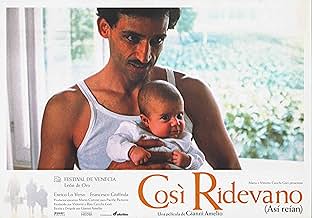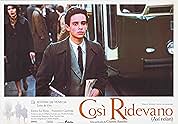Añade un argumento en tu idiomaTurin at the end of the fifties: two brothers have emigrated there from Sicily and the older works very hard to let the younger study and free himself from poverty through culture. The boy h... Leer todoTurin at the end of the fifties: two brothers have emigrated there from Sicily and the older works very hard to let the younger study and free himself from poverty through culture. The boy however is not keen on school and would like to begin to work. When after some time he gets... Leer todoTurin at the end of the fifties: two brothers have emigrated there from Sicily and the older works very hard to let the younger study and free himself from poverty through culture. The boy however is not keen on school and would like to begin to work. When after some time he gets his degree however things take a violent and dramatic turn......
- Dirección
- Guión
- Reparto principal
- Premios
- 9 premios y 14 nominaciones en total
Reseñas destacadas
It shows one day in their life each year between 1958 and 1964, avoiding movie convention by not filling in the details of what's gone on during the time in between. It's left to us to figure out, or imagine.
While brave and challenging, the characters never fully develop, sometimes feeling more sketchy and symbolic than full blooded.
Early on I thought I might be watching a masterpiece, but as it went on, I felt (to quote Chicago Reader critic Jonathan Rosenberg) 'guilty for not liking it more'. Still, a strong and original enough film that I'd like to revisit it one day, and see if it grows even deeper on 2nd viewing.
The Way We Laughed is loaded with exciting Italian locales, flirts briefly with political movements, but the focus is always on what's going to happen to the relationship of these very different men. In no way a cheerer-upper, and not exciting in any conventional way, the performances are superb and the narrative compellingly mysterious if the viewer has the patience for scenes that attempt to accurately capture the process of decision making, to the way relationships often work.
"Così Ridevano" is a human movie about the relationship between brothers, and characters and fraternal sacrifices. The story is developed from 1958 to 1964, showing the economical situation of Italy, more specifically of Turin, and how the Southern immigrants from Sicily were treated and explored by their employers. It is touching to see how Giovanni respects the books and sees the importance of education contrasting in a counterpoint with the feelings of his reckless brother. The screenplay is divided in six chapters ("arrivals", "deceptions", "money", "letters", "blood" and "families") and uses ellipsis, jumping through the years and leaving many situations unresolved as if they were kept in secret. The storyline has many points in common with Luchino Visconti's masterpiece "Rocco e i Suoi Fratelli" (Italy in early 60's, the fight for survival of a family from the countryside in Milano and the relationship among brothers). However, the plot is never corny and the conclusion is totally unexpected and unpredictable. My vote is eight.
Title (Brazil): "Assim É Que Se Ria" ("That's the Way We Laughed")
¿Sabías que...?
- CuriosidadesThe title refers to the back page of a popular 1950s Italian magazine which had a section devoted to old jokes that were no longer funny but still evoked a sense of nostalgia. One such joke is repeated throughout the film: "How do you get four elephants in a Fiat?" The answer: "Two in front and two in back".
- ConexionesReferenced in Cannes Paradise (1999)
- Banda sonoraCucara cha cha cha
Written by Tony Vargas and Pepe Villa
Performed by Dámaso Pérez Prado
Courtesy of Peer International Corp./Edizioni Peersongs Italy Srl
Selecciones populares
Detalles
Taquilla
- Recaudación en Estados Unidos y Canadá
- 57.009 US$
- Recaudación en todo el mundo
- 57.009 US$





















